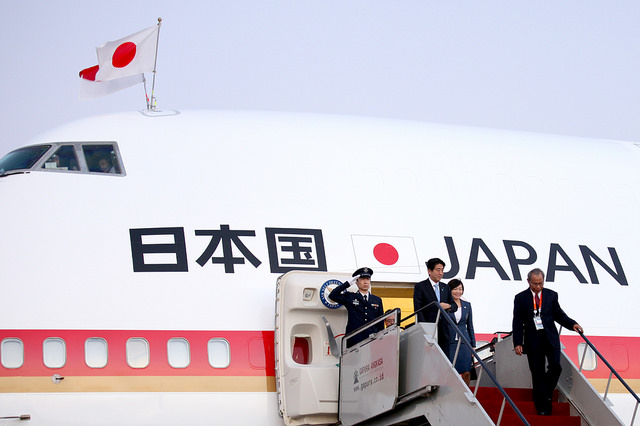A chance to get closer to Japan in the Trump era
Posted By David Lang on January 13, 2017 @ 11:54

When Japanese Prime Minister Shinzō Abe arrives in Australia today, the second stop on a four-nation regional tour, he and his team will have thought deeply about the state of the Australia–Japan relationship, what it represents and where it is heading.
Our strategic ties have cooled considerably since the days of the Abbott government and, subsequently, Japan’s needlessly bruising experience in its failed bid to build our next-generation submarines. Since then, the ball has been in Canberra’s court when it comes to fleshing out the special strategic partnership signed by Abe and Tony Abbott—ideological blood brothers—in July 2014.
Tokyo understandably was disappointed by the submarine decision but remains optimistic about fulfilling the relationship’s potential with Malcolm Turnbull at the helm, given our broadly aligned interests, values and concerns. Evolving the strategic partnership has become more pressing, and the bilateral relationship even more significant, since Donald Trump’s election.
Both Canberra and Tokyo are keen to discern the Trump administration’s strategic intent in Asia. Donald Trump has made patently clear that he expects America’s allies to do more for their own security. As the northern and southern anchors of the US alliance system in the Asia-Pacific, Japan and Australia must prepare to show the US president-elect that they are valuable partners working to support shared interests. They should consider how to encourage Trump to maintain America’s commitment to the region, together and separately.
Candidate Trump annoyed Tokyo with his hostile characterisation of Japan as a security free-rider that should pay more, and do more, and that would be “better off” with its own nuclear arsenal. His obstinate rejection of the Trans-Pacific Partnership, which was stoically ratified in the Japanese parliament last month, was another hefty blow. Intemperate Twitter broadsides and protectionist, isolationist “America First” rhetoric didn’t go down well in Tokyo.
But since Trump’s election, Abe has sought to deal with the world as it is. He swung by Midtown Manhattan to become the first world leader to meet the US president-elect the week after he claimed victory. Reports of an Abe-Trump summit later this month further indicate that the Japanese Prime Minister is intent on quickly building a warm rapport with his new American colleague. The alliance between Washington and Tokyo is often described as the “cornerstone of peace, security and stability in the Asia-Pacific”. Abe wants to keep it that way by showing Trump that Japan is reliable and ready to muck in.
Tokyo is trying to figure out how best to wheel-and-deal with Trump and his coterie, with Abe out to win friends, grow influence and keep Washington engaged in the Asia-Pacific. By spelling out just how Japan underwrites Washington’s presence and interests in Asia, the statesman is pitching the businessman.
The value proposition on offer is compelling. Since returning to power in 2012, Abe has brought remarkable stability to the prime minister’s office after the revolving-door leadership of the preceding six years. He has been an indefatigable diplomat, travelling widely to extend Japan’s strategic horizons and forge new security relationships in the region. And he has made significant moves to modernise his country’s foreign and defence policy based on the idea that Japan should “proactively contribute” to global peace.
The Washington Post reported last weekend that ‘the Trump transition team is preparing its own pivot to Asia’— a reference to President Barack Obama’s politically underpowered rebalance to Asia. Transition officials noted that the new administration would ‘take a hawkish view of China, focus on bolstering regional alliances, have a renewed interest in Taiwan, be sceptical of engagement with North Korea and bolster the US Navy’s fleet presence in the Pacific’.
The news would have assuaged some fears among America’s Pacific allies and partners that the 45th president was set to retreat from Washington’s commitment to the region. While we can’t know the degree to which the Trump administration can deliver on boosting the US presence in the region, it’s clear that now is a good time for Australia to have a friend such as Japan.
With Abe’s arrival today there’s no doubt the Australian government also has been reflecting on its relationship with Japan. Hopefully it has grasped the significance and opportunity of Abe’s visit and corralled some weighty policy proposals to give a fillip to our strategic partnership.
In the coming months, our defence and foreign ministers are set meet with their Japanese counterparts for their annual 2+2 consultation, and Richard Court will get to work as our new ambassador to Tokyo. Canberra must harness the opportunity of Abe by encouraging an active, responsible and “normal” Japan to take on a greater security role in the region and looking for novel opportunities to further institutionalise our security relationship.
Sizeable shifts in the regional environment and the arrival of a new US president compel Canberra and Tokyo to contemplate how to strengthen their respective positions and sustain a stable, open and prosperous order in Asia. Hillary Clinton couldn’t have known that her campaign slogan, Stronger Together, would take on a different life half a world away once her opponent moved into the White House.
Article printed from The Strategist: https://www.aspistrategist.org.au
URL to article: https://www.aspistrategist.org.au/chance-get-closer-japan-trump-era/
Click here to print.